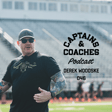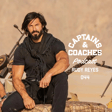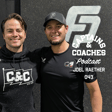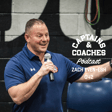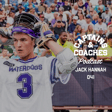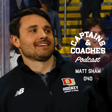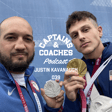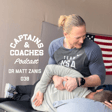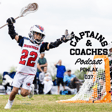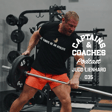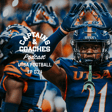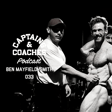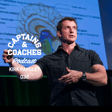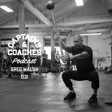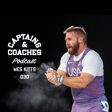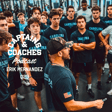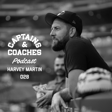Pursuing Happiness Beyond Job Titles
00:00:00
Speaker
we're more than our jobs, we're more than our titles. um Those don't really bear a ton of weight to who we are as people and your life's gonna just go by without you without you realizing you're just a passenger in it.
00:00:12
Speaker
And so I think it's super important to really just pursue the things that make you happy personally.
Podcast Introduction
00:00:17
Speaker
Welcome to the Captains and Coaches podcast where we explore the art the science of leadership through the lens of athletics and beyond.
Guest Introduction: Ryan Metzger
00:00:24
Speaker
I'm your host Tex McQuilkin and today we're setting up shop at the and NSCA Coaches Conference to dive deep with someone who truly embodies the transformative power of intentional leadership.
Coaching Philosophy and Empowerment
00:00:36
Speaker
Our guest is Ryan Metzger, the 2022 NSCA Assistant College Strength Edition Coach of the Year, whose journey from gymnast to elite coach has redefined what it means to develop athletes holistically.
00:00:48
Speaker
Ryan has mastered the delicate balance of pushing athletes beyond their perceived limits, while creating trust necessary for genuine growth. Her unique perspective on individualizing team training and empowering female athletes has created ripples of transformation that extend far beyond the weight room.
00:01:07
Speaker
We'll explore how emotional intelligence shapes athletic development, the art of knowing when to challenge an athlete versus when to support, and why the most educated professionals in sports often face the greatest struggle for finding respect.
Balancing Coaching and Presentations
00:01:22
Speaker
With that, let's hand it off to Ryan. Ready, ready, and brave. Well, thank you so much for having me. Yeah. You very busy this week. Super busy, but I love it.
00:01:34
Speaker
Yeah. How many presentations are you a part of or leading? um Right now, three that are on the books. So we have two today, one tomorrow. ah We've got this recording. I've got some other stuff to do today, but I love it, like i said.
00:01:49
Speaker
Yeah. Rock star. Yeah. And a blind reach out.
College Athlete Experience
00:01:53
Speaker
So thank you for making time. I'm excited. ah lot of experience. And i'm I'm always excited to highlight amazing Division III athletes that then step into coaching roles and have success no matter the level.
00:02:06
Speaker
I feel like it's a trend. ah It is. Yeah. D3 All-Stars, I joke. There's a lot of constraints at that level that I feel help lead coaches to think on their feet, be agile, and prepared for anything and everything that is athletics.
00:02:22
Speaker
Absolutely. You learn a ton at the D3 level and how to navigate. and And I think it really helps at the Division I as a coach. And D3 takes a lot of sacrifice because it's a lot of the time and we're still paying for school for the most part outside of academic assistance.
00:02:39
Speaker
Absolutely. So not only all-star in the classroom because a lot of your scholarship and payment comes through your grades. Yeah. um And then on top of it, hey, let's go be an athlete.
00:02:49
Speaker
So that's a large commitment as well. Yes. So take us back to that time. What was that motivation? Did you feel such a draw and identity to being an athlete that you felt, hey, I want to continue this for next four years?
00:03:01
Speaker
You know what? When it came to making a decision for college, I knew that I had the skill set to be a Division I athlete. um And I realized at the end of the day, my sport, gymnastics, unless I'm going to be you know elite level into the Olympics, I I have to find a career after this.
00:03:19
Speaker
um And so I knew that after college, my athletic career, as far as a gymnast was concerned, was really going to be it. And so I really wanted to invest in my education and find a program that was really going to be the springboard into a really great coaching career. um And so that's why I picked to be a division three athlete, because it really fulfilled the desire to still compete and be a high level athlete. But at the same time, i really got a quality education that was going to set me up well for a good career.
00:03:46
Speaker
I felt when I say D3, and that's why I joke and turn it into humor, D3 All-Star. Yeah. When I say Division III athletes, sometimes people look down on you because they they didn't quite understand.
00:03:58
Speaker
A lot of high academic schools are Division III schools. Absolutely. So the way into those schools is through athletics. It is. So i I kind of make a joke about it because they don't quite understand. And all right, well, let's be open, my friend.
00:04:13
Speaker
Yeah. And sometimes i I get that as well. Like even when I tell people, they're like, where'd you go to school and do gymnastics? I'm like, oh, a small school in Wisconsin. and Like I almost feel myself shrink a little bit to tell people that. But it's like, no, something I can be really proud of because it it really set me up well for a great career. And the athletics was a massive part of how I navigate things now. So.
00:04:35
Speaker
Yeah, and it's it's it's bringing some pride to it. And then they they may not have heard of that school, but you can help them understand. and and then they know, sometimes they know the hours that an athlete puts into it.
00:04:48
Speaker
Yeah. And again, you know, I think there's such a large demand on athletics in Division one, and maybe it's not understood, but there's still a very large time demand when you're a Division three athlete as well. And, and, you know, again, like I said, school is so important at that level, because that's where your scholarship comes from. And so you really have to learn how to balance all of that um as you navigate four years of college.
00:05:11
Speaker
it Yeah, professor, head coach, there's a lot of yeah and new teammates all around. So the the dynamics, the opportunity, it's it's an excellent
Discovering Passion for Coaching
00:05:22
Speaker
chance to learn. You went to this school to help you become ah coach, so you knew you wanted to coach.
00:05:27
Speaker
I did. um And I didn't really understand what area or how to really even get into the field. um I knew that I wanted to be involved in athletics and I thought my way in was being an athletic trainer.
00:05:41
Speaker
So I thought I had to be the person that taped the ankles and did the prehab rehab. And that wasn't super appealing to me. um And so when I did go to, you know, Wisconsin Oshkosh, that was my declared major. And I learned how to tape and do all of that. Shoehorn. Yeah, great stuff.
00:05:58
Speaker
um but But at the same time, I was like, there's got to be something more. Like, I don't want to be touching feet and ankles all day. no um I don't want to have to sit with an injured athlete and be happy about, you know, a toe movement.
00:06:13
Speaker
um ah Let me work on the, like, performance side of stuff. And how do I do that? And the Continuing gymnastics into college, I got introduced to my strength and conditioning coach at Wisconsin Oshkosh.
00:06:25
Speaker
And i was like, holy cow, this is a jump.
Career Development and Opportunities
00:06:28
Speaker
I was like, I can work on the performance side of stuff, help athletes and coach and like teach them to lift weights and do all these things that are going to help them be a better athlete.
00:06:36
Speaker
And I remember talking to my strength and conditioning coach um being, you know, a rug rat of an athlete because I never wanted to listen. And we can talk about that too. But I remember going into his office and being like, I'm going to take your job one day. This is totally what I'm doing.
00:06:51
Speaker
And he was like, go for it. Please, do me favor. but but i just fell in love with the fact that this was a part of you know and athletic experience and i could have a part of it and so when i learned that coaching in the weight room and being a strength and editioning coach was a profession i was all in and luckily for me wisconsin oshkosh revamped their whole kinesiology program They had strength and conditioning as a minor. So I picked that up.
00:07:19
Speaker
Um, and I think it was one of the first in the nation to do so. And so I really got in on the ground floor and I was super thankful for the opportunity. That is cool because strength and conditioning as a major is, it's blowing up, it's taking over. Yeah.
00:07:31
Speaker
And there's a ton of really, really great coaches that have come out of Oshkosh. And I know there are certain universities that really have that reputation, such as like Springfield and stuff like that. But I think Oshkosh is really growing in that field as well because there's so many D3 or D1 coaches coming out of that school.
00:07:48
Speaker
Yeah, I love it. Yeah. My university, we had health sciences, but then I had ah a teammate, a classmate. She was captain of the volleyball team. And now she's, we were just performance connected through that. Would go to our fitness center, yeah train, and then through it all just became leaders in the industry just because of an interest. Yeah.
00:08:09
Speaker
So we were ah just 20 years together, just ships riding through the night, different sports interest. And we we had a great time. So she's now training Green Berets.
00:08:21
Speaker
That's amazing. and Yeah. Kicking ass. hey Yeah. That's so cool. I love your internship story all the way to University of Kentucky. Yeah. Lexington is one of the most beautiful cities I've been to in the country. and I love it. And it true is that what drew you there or what kept you there?
00:08:36
Speaker
no No, I knew nothing about Kentucky. And it sounds so funny because I think when you're in the you know athletic atmosphere, it's like Kentucky SEC. Now we're at this power four division, right?
00:08:50
Speaker
And I had not a clue. um Again, I was a D3 athlete. I grew up in Chicago, so I'm a Midwest girl. I know nothing about the South. I don't know anything about horse racing. I don't know about the SEC and Division I. And so honestly, I walked into my advisor's office and he was like, hey, we had a student go to Kentucky. Why don't you look into it? and i was like, sure.
00:09:14
Speaker
And that's literally what got the ball rolling. I just happened to email someone at Kentucky and my email got into the right hands. And, you know, the department down there and the head there, um
Social Dynamics in Coaching
00:09:26
Speaker
Stephanie Tracy Simmons, one of the only female directors at the time in strength and conditioning, she was like, come on down. And I think it just so happened, fate, that I happened to...
00:09:37
Speaker
find Kentucky, find a program that had a female head and allowed me to just have an experience. And so when I got down there, it was initially just to complete credit for my undergrad. I went there for the summer.
00:09:51
Speaker
I really, really loved it. And they seemed to reciprocate that they were like, we appreciate you being here. And if you wanted to come back, we will figure out a way to make this work. um And so that's what I did.
00:10:01
Speaker
I really kind of just bet on myself and I moved and was there for four years. Which sports were you working with? Oh, man. um By the time that i left Kentucky, I think I had worked with every single program minus men's basketball, baseball, and rifle.
00:10:17
Speaker
Yeah. So I really bounced around. um i was fortunate enough when I became a GA, which was a year into my internship. So I actually didn't get a GA right away, which was great because I i got to be on the floor and coach and didn't have to worry about school.
00:10:32
Speaker
um But when I was a GA, I had men's swim. I had dive, women's tennis, ah women's cheer. And then toward the end of my time, I picked up women's soccer. So I had five of my own teams on top of helping with everything else.
00:10:44
Speaker
Yeah. And what I did want to focus on is you're going from an individual sport yeah that's so focused on your performance, and now you're getting dropped into these team training environments.
00:10:56
Speaker
So did that individual sport lifestyle prepare you or put you at a ah ah ah gap, a step back that you really had to overcome? You know, I think because I was so young and naive at the time, thinking about it in that frame, I didn't even realize that I was going from an individual sport to like being the team leader of these massive groups.
00:11:19
Speaker
I just was like, okay, let's do it. ah yeah Let's navigate and figure out. But what I had realized really early on is... I think a lot of times people see gymnastics as being very individualized.
00:11:31
Speaker
And in the high school setting and in the college setting, it really is a team sport. And you understand that your individual contributions is what drives the team as a whole.
00:11:45
Speaker
And so I realized if I could you know, have great work ethic and be disciplined and just really execute things well, that was going to help my team overall. And so that was really kind of my in when I got into more of the team sport is that I realized if I could connect with these athletes individually and make them understand how their individual contribution helped the team,
00:12:08
Speaker
that was probably going to elevate everyone as a whole. yeah um And so that's why I learned how to connect individually, work individually. And then I was like, okay, this is going to help actually navigate everyone forward. So I think that was more so my connection and and why my coaching style is a bit more relaxed and pulled back. And
Division III Athlete Challenges
00:12:27
Speaker
I'm not so much a yeller and a blanket statement. And this is how it is for everyone. um I'll try to cater to the individual and those connections instead.
00:12:35
Speaker
As you're speaking, I can imagine where gymnastics team, you have your role. So sometimes it's your individual event. And then now in in team sports, I still have my role. I still have my position. I still have my job to do. yeah And then it still affects the team points and scores and our ability to to compete.
00:12:55
Speaker
Yeah. Yeah. And i think that that. point sometimes gets a little missed because it's like, you know, at the end of the day in a team sport, you could have done amazing and you get no reward for it because you might've lost the game or whatever it is.
00:13:09
Speaker
But if you could just be the best that you can be in that role overall is going to help contribute to the team in some aspects. And a lot of people going from high school to college, the amount of work that you have to do and put in So I imagine being a a ah youth and high school gymnastics athlete, what was the difference in gap between all the training? Was it similar at both levels?
00:13:36
Speaker
Because I know all other sports, it's it's almost like 8X. Yeah. We're jumping up. The thing about gymnastics is from a really young age, you are in the gym constantly. um And I reflect back a lot. And I think I've told this story a lot, but I remember when you want to be really good at a sport like gymnastics, you go to a club and you invest a lot of time in these clubs.
00:13:58
Speaker
And I was 10 years old at a club working out four hours a day, six days a week, and then begging my parents to go on a day seven because I wanted to go.
00:14:09
Speaker
So when i look back at it, I'm like, wow, 24 hours a week in the gym as a 10 year old. And I'm like, we have 20 hour rules in college. And so I remember getting to college and them being like, you guys are really over your 20 hour. Like you got to pull back. And it's like, what do you mean?
00:14:27
Speaker
but So I think for me with my sport in particular, that jump wasn't as massive. It was more so just the concentration of where are we focusing our efforts because you can be a bit more relaxed in high school. You don't have to go to a club or be as serious and you're only just training during the season. But in college, it's year round like that.
00:14:49
Speaker
So that might have been the bigger jump, but
Transition to VCU and Mid-Major Experience
00:14:51
Speaker
in the day-to-day, like daily deposits, it's like, I already had that. I was good. Easy day. Easy day. If we could call it, you know, 30 minutes early, it was like, oh, I got a break.
00:15:01
Speaker
So it was good. So speak to us about developing your voice in that in that internship time. So not only the the X's and the O's, the blocking and tackling for your admin and all the little stuff on the job, but then finding the confidence to step into any sporting arena, male, female, yeah any sport that you've never played, but still find a way to have an impact and just have that that that aura, that confidence yeah to step onto the floor and, hey, let's get better today.
00:15:33
Speaker
Early on I'm someone that observes constantly. i um I watch, you know... behaviors and how people move, how people stand, what they say, how they say it.
00:15:45
Speaker
So I did a lot of observation early on so that I could pick up on certain tendencies with athletes. What do they like? What do they not like? What are some areas that maybe they're struggling in? And so when I look back at finding my voice, one, tried to find ways to build relationships and have impact Mm-hmm.
00:16:07
Speaker
because i realized that if i try to be authoritative or come in and really have no kind of relationship with these athletes their buy- in is probably going to be nothing and when they find out i didn't you know complete their sport i wasn't a swimmer i wasn't a volleyball athlete it's going to be even less And so if I can find a personal relationship with them first, I knew that was my way in.
00:16:32
Speaker
The second thing that I learned with being at Kentucky was that I picked up the sport of weightlifting and I started to do it at a very, very high level. And luckily for me, Kentucky was very Olympic based.
00:16:43
Speaker
That was really the core of their program. And so I knew that if I could display my expertise in something that is so technical, I was again going to earn their respect and their buy-in.
00:16:54
Speaker
And so I watched and observed for a little bit and then I would give a coaching cue here and so
Role at Clemson and Mentoring
00:17:00
Speaker
maybe something there. And then I'll help take the weight off the barbell here. And so I'm starting to gain their trust as a young coach, but then I can start to display like,
00:17:10
Speaker
I have a lot of information that I can give you guys if you're open to hearing it. And so I almost did it that way. um When it comes to coaching men versus women, again, same thing. I didn't want to be authoritative with men in the weight room because they're going to want to show me up anyways. They can lift more than me. They can do these things. And so it was more so like, let them see me train.
00:17:33
Speaker
And so what I would do on purpose is when I knew that I had a male group coming in or I was working with the football team or there was an off day, I would go train in front of them. um And that really helped create a lot of buy-in because they finally saw, they're like, oh, she can do these things.
00:17:52
Speaker
And so it gave a lot more weight to my coaching cues and when I would step in and say things. what Pun intended? Yeah, exactly. Pun intended. More weight to the cues for weightlifting. um And with women, what i realized is we needed to just really boost their confidence.
00:18:08
Speaker
have a lot of open lines of communication, give really clear expectations. I tend to coach them more positively. And I'm like, hey, that was a great movement. Let's try this. Whereas with men, I can be like, okay, no.
00:18:21
Speaker
And let's move on this way. um So my style kind of changed a little bit as my audience changed. Yeah. And then the more reps you get communicating and speaking, and then you're open and seeing the, having social awareness to see how the cue lands to whether they are more guarded, they're more scared moving the weight.
00:18:44
Speaker
Okay. Maybe i I need to try that a different approach and then come back. Yes. Yeah. Social awareness is key, especially in those giant team dynamics. Everyone's an individual.
00:18:55
Speaker
on the team Yes. Having the ability to be very like socially dynamic or socially agile as a strength and conditioning coach, I think really plays to your ability to be successful because you have to read situations so quickly and decide what's going to work best for this athlete.
00:19:12
Speaker
Yeah. the I had a flashback, funny story. I applied for an internship at University Kentucky. Did you? And I got a call. Okay. And 15 minutes in the call, we started to get into Olympic weightlifting conversation.
00:19:25
Speaker
And I was like, and I'm joking. course, I was like, oh yeah, it's just just jumping with weights. And they're like, huh. Okay. And then if you've seen Office Space, it felt like all the air out of the room got sucked out. And they're like, it's like when Michael Bolton is like, oh, you can just call me Mike.
00:19:45
Speaker
Yeah. And mean with the bobs, they're just like, okay, well, it was nice to meet you. And the door was immediately shut. and I'm like, why? Can can I explain? No.
00:19:55
Speaker
Yeah. Well, yep. They, they do take it very seriously and and I knew that was going to be my in. Um, so I made sure to really lean into Olympic lifting. Yeah. Don't, don't take it lightly. Don't joke. Lightly pun intended here too. Yeah.
00:20:10
Speaker
Time out. Every so often I receive messages that remind me why we created the old bull program today. I want to share Kevin's story with you, not just because it showcases physical transformation, but because it represents what's possible when training evolves beyond just sets and reps.
00:20:28
Speaker
Kevin recently reached out with a message that captures the essence of what we're building. Here we go. Hey, Texas. This is Kevin from Old Bull. Just wanted to shoot you a quick text to say I'm really digging the program and seeing great results.
00:20:41
Speaker
Made a few dietary tweaks, up my protein for one, but through the training, I've been seeing more muscle and strength gain with infinitely less pain in the process than probably any other point in my lifting career.
00:20:55
Speaker
I recently got together with some friends I hadn't seen in a couple years and every one of them made a comment about how they've never seen me looking bigger or stronger than I do now. Appreciate the program and what you're doing to make it excellent. Here's what really matters. This isn't about quick fixes or unsustainable programs.
00:21:14
Speaker
Old Bull engineered for the experienced lifter who values longevity as much as they do intensity. We're talking about intelligent progression that respects your body signal while constantly pushing your boundaries.
00:21:28
Speaker
If you're ready to transform your training into something more sustainable, more intelligent, and ultimately more impactful, the Old Bull program is your path forward.
00:21:39
Speaker
Click the link in the show notes and take control of your strength journey today. Now the transition into full-time position because that is a big step
Career Moves and Opportunities at VCU
00:21:49
Speaker
for a coach. Absolutely.
00:21:50
Speaker
and And how did you go about selecting the school? Did they select you? Did you apply to different places or find one chance that just fits you well? I'm extremely intentional and I'm very goal oriented. I know that we talked about this. And so toward the end of my graduate assistant position at Kentucky, I sat down with the director and that was a new director at the time.
00:22:11
Speaker
um You know, Stephanie Tracy Simmons had moved up to admin. John Spurlock was then the director, and that was someone that I had worked with very closely while he was the assistant there.
00:22:22
Speaker
And so we had sat down toward the end, and he was like, write out all of your goals. What do you want to accomplish in this field? How are we going to go about doing it? And so I had realized that I made this big jump from D3 to D1, from Wisconsin-Oshkosh to you know Lexington, Kentucky with the SEC, you know. um school and I didn't have any steps in between.
00:22:47
Speaker
And I felt like that was really lacking in my development. And so one of the things that I did when looking for a full-time position is I said, I want to go to mid-major school.
00:22:59
Speaker
I want to go to something that's smaller, not a d three still D1, but I want to understand what team dynamics are like. I want to know what it's like to have maybe less resources. I want to know what it's like to have You know, athletes of different talent skills and athletes that their goal is not to be professional. It's to go into the career force and figure out that life. And so I said that I wanted something smaller.
00:23:23
Speaker
And so when I was looking for full-time positions, um VCU was a perfect fit. And I ended up applying there. And it was one of those moments where your timeline is running out a little bit. And it's like, all right, I either get this job or I back up my stuff and go back home. And this was a great experience.
00:23:42
Speaker
um And Tim Contos at VCU just happened to call and it was a great opportunity to be there. And I took that position because it was everything that I had said that I wanted in my first role.
00:23:55
Speaker
So, um yeah, I don't know if maybe that was just a little bit of fate or maybe that was just planning on my part or whatever it may be. But I'm super thankful that my first full-time position was something smaller. So I felt like I could fill that gap.
00:24:09
Speaker
Yeah, i I like VCU and then know Daniel Roosk. Yes. Basketball standing conditioning coach. I know him through UT, University of Texas. Yeah. But then he came from VCU and went back to VCU. He did. It's a special place. Uh-huh. And in speaking with him just through the conferences, he liked it because he had four years to develop dudes. Absolutely. Versus the UT, was a lot of one and done guys, a lot of lottery guys. So I was like, man, I admire that. And he's also got some property and raising a family. so He's crushing it.
00:24:41
Speaker
Yeah. Yeah. And you get the ability to do things like that at a smaller university because, you know, sometimes you have so many athletes and so many teams that you just can't be at every practice or every game or whatever it is. So you try to make an impact in the areas that you're able to.
00:24:59
Speaker
But at the same time, you can have a family and have things outside of coaching that you really enjoy so that you're not only defined by your coaching role. Yeah, that's a good mindset to to highlight as a coach, because sometimes coaches, you got long hours, you don't get a lot of gratitude thrown your way. So you can focus on the negatives, but then you're highlighting a lot of the positives in in ah in a mid-major school situation that that there's there's chances to grow as a person outside of your job.
00:25:32
Speaker
Absolutely. And I think that it's great to highlight that because I think a lot of young coaches sometimes go for the logo. They want the logo on the chest or they want a name or they want whatever. And there's nothing wrong with, you know, being somewhere that smaller and developing as a coach. And that's one of the stories that I've told before is, you know, at Kentucky, I i missed out on being a grad assistant the first time around. I didn't get the position.
00:25:58
Speaker
And at the time I felt very jaded and thought that it was a slight at me, but I realized i got the opportunity to really develop. um And that was super beneficial down the line. And same thing with VCU. I mean, Tim Contos did a great job of mentoring me and really developing me as a young coach and just person that a lot of the tools that I learned there have been super valuable.
00:26:21
Speaker
How long were you there? ah VCU was about four years. Four years, it's a good chunk of change. Yeah. You get to see athletes go from freshman to senior, like we talked about. And that's massive because there's always a rotating door of strength and conditioning coaches. And so for an athlete to have continuity throughout their entire time as an athlete, I think is super beneficial to them as well.
00:26:43
Speaker
Yeah, especially on the Olympic side, a lot of turnover. Yeah. Yeah, with with the team and then stepping into that role, I noticed a lot of athletes that maybe they had one, two, three coaches before me,
Developing New Sports Programs
00:26:56
Speaker
and this is their senior year.
00:26:58
Speaker
was a lot of back off. I don't know how to describe it. Yeah. Just a sense of apprehension. Because it's like, where's the long-term development for that athlete? and' Yeah, where I'm coming in as a positive force, there they're holding back for some reason. So then just feeling and seeing that and then you know spending more time with them or finding ways to communicate. and have them Absolutely. the So from VCU, where do we go?
00:27:24
Speaker
We go to Clemson. Beautiful. Greenville, South Carolina. Another beautiful city. Yeah. So ah we're about 40 minutes from Greenville. Oh, I didn't know that. Yeah. so Clemson is its own little college town um tucked away in South Carolina.
00:27:40
Speaker
So I haven't been to Clemson campus. i I had an interview at Furman University. Okay. And that's in Greenville. That is beautiful. yeah That is when I think Greenville That's what I think about. It's a great city.
00:27:52
Speaker
It really is. um And Clemson, like I said, it's just kind of very small town, college atmosphere. And it's, you know, about 40 minutes from Greenville. So you're not too far away, but um everything is all Clemson there.
00:28:05
Speaker
so I believe it. What a color scheme. I think it's the only orange and purple team out there. Is it? I haven't done the research. I haven't either. Just the winning wise.
00:28:17
Speaker
The only winners with orange and purple. Yeah. Well, you know, we got to love the contrasting colors for a university. It's unique. You stick out. Absolutely.
00:28:28
Speaker
but People can um notice that color scheme anywhere. And it's so funny. One of my friends worked at LSU and, you know, they're yellow and purple. And he's like, it's very normal to have yellow and purple, but you don't realize just how loud that is outside of LSU.
00:28:46
Speaker
It's the same thing for Clemson. Yeah. Yeah. and So now were you working with one sport? Were you multiple sports? How did this transition change where you're growing into a a ah now back to a power four university? Yeah. So my goal, again, when we sit back and think about the goals, my goal was to after mid-major find that big university again. and And I knew that I really enjoyed the SEC and I wanted to take a step into another conference. And so, again, that was my intention. I wanted to be part of an ACC school.
00:29:18
Speaker
You know, explore another state, another city, all of that stuff. And so stepping into the role at Clemson, when I interviewed for that role originally, it was a softball only a softball position with potential for some other sports.
00:29:32
Speaker
Was it going to be rowing? Was it going to be tennis? It was really kind of up in the air. Um, softball was a brand new program there. cool So, yeah, so they had just started the program, hired, you know, the head coach, John Rittman, who's awesome. Um, you know, has a massive background in coaching and working with USA softball. So he really is doing awesome. And, um,
00:29:53
Speaker
When I interviewed there, like I said, it was for softball, and I knew that. And so I knew that that was my angle to get the position. And so I really did my best to impress John and really outline what it would look like to take a team that's never competed in college and really make them a contender. And so when I talked to him, I didn't talk to him about, we're going to trap bar deadlift, or we're going to clean, or we're going you know, I didn't do these things. I said, we're going to, you know,
00:30:19
Speaker
talk about culture and we're going to lay the foundation for a winning team. And this is exactly how I'm going to do it. um And I, you know, gave him, you know, by season what I'm looking for.
00:30:32
Speaker
And luckily I got the position at Clemson. And when I got there, it was in the summer and soccer is training in the summer. um That's kind of their time to train, getting ready for season.
00:30:44
Speaker
And my director at Clemson, he was like, you know, we want to feel out. your second sport. We know softball is going to be the first one. What do you think about soccer? Like, I noticed that you're doing really well with them. And I was like, I would love it. I said, if I could, I was like, if I could have soccer and softball here, like I will be so happy.
00:31:03
Speaker
And so that ended up being my role is so I took on soccer and softball and um ran the internship department while it was fun. Yeah. ah Yeah. i love coaching coaches.
00:31:15
Speaker
It's great. um And the idea of mentoring and helping young professionals is something that I've always wanted to do. And I did it at VCU and I got to continue that at Clemson. And I just think having really great mentors helped me. And so I just wanted to pass that down to other people.
00:31:33
Speaker
So we'll stay with that. How did you structure the development, the education? Was it, did it start with the book and then get to the floor? we start with communication and sprinkle in the...
00:31:45
Speaker
ah The X's and O's? Yeah, I mean, they were different programs at VCU versus Clemson. And so when I got to Clemson, they had already had a curriculum in place. And basically, it was my job to revamp.
00:31:57
Speaker
Maybe we could take some things from that curriculum, but really build out this program. And so what we did was a combination of things. um So they were given a ton of information as far as our technology that we were going to utilize, how to run and troubleshoot it. So there was a technology component.
00:32:15
Speaker
There was a coaching component. They had to learn how to regress and progress and cue our six main lifts before we allowed them to coach the athletes. So they had to take me through them and pass them through the lifting stuff just so that we're all on the same page of how we cue, how we verbalize,
00:32:33
Speaker
There's no confusion for the athletes. And then the other component of it was just education. And so for me, the other big part that I wanted to bring to the Clemson curriculum was leadership because i knew how important it is as a strength and conditioning coach to have really strong leadership skills.
00:32:52
Speaker
And so what I did was I made them read um a leadership book throughout the course of the semester. And so we had, I guess, those four main components. but let's Let's hang out in leadership for a while.
00:33:05
Speaker
What were those four books? Did it change every year for you as you learned? um So it did not change because every time we would get a new batch of interns. Mm-hmm.
00:33:16
Speaker
And so I wanted them to have certain tools as we go through. So when I was at VCU, I did the 21 Irrefutable Laws of Leadership as their main book. So every couple of weeks, they would have chapters due to me about a lesson that they learned.
00:33:31
Speaker
When I got to Clemson, the book that I had them read was Chop Wood, Carry Water, talking about the process. And I thought that that was super important for interns to understand, to continue with the process, because you're just starting out in your coaching development. um And so what I, excuse me, what I had them do was um we would have chapters do every you know week and they had to take the lessons that they learned from that book.
00:34:01
Speaker
And how does that apply to your situation now? And so that was the development that I would have for them. Yeah, i like that. It's setting a foundation for self-awareness. So we're not just reading this and memorizing this like they did in undergrad.
00:34:16
Speaker
Absolutely. Now we're it's more of a graduate style here where it's read this. And now think through it, communicate through it, and how does this apply to your your team, your situation?
00:34:27
Speaker
And so help us walk through, did you prepare them not only to speak to athletes, but also speak to sport coaches? Because that's another challenge. And I mean, it got you the job at Clemson.
00:34:39
Speaker
Is your communication leading up One book that i I really love and will highly recommend it's is John C. Maxwell's 360-degree leadership. View that as a strength coach because I got to lead up to head coach.
00:34:52
Speaker
I got teammates here at ATC or another co-strength coach, and then I lead down to my my team. And then I view team captains as that 360 because you're leading up to sport coach, you're leading down to team, and you're you're caught in the middle sometimes.
00:35:09
Speaker
Yeah. So that was actually a part of the curriculum that I was looking to build. um During, as I was kind of exiting Clemson, one of the things that we were looking to develop was we wanted to develop our interns to be able to speak to sport coaches, have a really great interview. how do you interview?
00:35:30
Speaker
And so the thought process was, let's take an assistant sport coach That maybe is looking for a head coaching position and they get the opportunity to interview a strength and conditioning professional because that might be part of their role as a head coach. So we're giving them mock interview experience.
00:35:51
Speaker
Let's get our interns. to mock interview with that assistant sport coach so that they could understand how to interview with a sport coach and get the job. And so, again, we didn't get to that point while I was there at Clemson, but that was the thought process is let's make this mutually beneficial for both sides so that a sport coach can then move up and be ahead. But also our department is teaching these young coaches how to act professionally in that setting and really kind of land the interview and get the job.
Communication and Coaching Interviews
00:36:24
Speaker
So that was the thought, and I wish we would have gotten there, but um maybe someone else out there can can take that and run with it. But um I would like to get to that point because it's such an important part of what we do, and I feel like it's never talked about or taught.
00:36:39
Speaker
Nope. Yeah, we we battle a ah lot of assumptions with that. that this podcast. So like that's a big one. Yeah. Is, is even that interview process for the sport coach down to the strength coach, because you can get sold of a lot of magic beans. Absolutely. And I, I've lost out on, on jobs to people that I know are not the right person and fit for the sport or the team.
00:37:01
Speaker
And then at that stage, I just watched them fail. Unfortunately, I know the athletes that are getting hurt that are not competing to the highest level of their potential.
00:37:12
Speaker
And I just got to eat it. And you know what? i An interesting part of this story, and i don't I don't know how many people know this, and I'm not sure if you know this, but originally when I interviewed for the job at Clemson, I didn't get a call back.
00:37:25
Speaker
Um, and so, so it's like, how did I get that job? And actually me understanding how to talk to a sport coach is what saved me because I knew that I was like, okay, maybe the strength and conditioning department doesn't think that I'm a great fit for their department.
00:37:41
Speaker
I'm going to, you know, let the sport coach know that I'm a great fit for that sport. um And so that's why I was saying I knew that that was my angle and I knew that that was a great place for me and that I would be a great fit. And I just had to display that.
00:37:53
Speaker
um And I'm thankful that I got the opportunity to do that because that helped me get my job there at Clemson. And the softball team did amazing. Yeah. um Their first season was cut because of COVID. We were in 2020.
00:38:08
Speaker
But when they had the opportunity to have their first full season, they won the ACC in the regular season. So we did an awesome job. And I knew that we were going to do that because we were laying down the correct foundation. And I knew that I would be a great fit for that position.
00:38:23
Speaker
So crazy. Yeah. but So what was your step? Did you... cold email the the coach to follow up? I did not. So yeah, so what happened was um I had interviewed for the position and it was just a phone interview.
00:38:38
Speaker
And they had asked me a question that really tripped me up, almost like your Olympic lifting one with Kentucky. i They asked me a question about um research.
00:38:49
Speaker
Who do I research? What do I look into? And I was like, well, i you know, I don't research people. I research things I'm interested in. And you know If I have a question, then I'll seek out more. And they're like, well, who?
00:39:01
Speaker
And I was like, well, i you know I go to my circle first. And then they're like, no, but like give us a name. i was like, ugh. And I kind of tripped up on the question about research. And I was told like, hey, we appreciate it, but we just don't think that this is going to be a good fit.
00:39:17
Speaker
And they're very research-based, and I got it. um I understood that you know maybe that was my weak point. And I was like, okay, you know, reflecting forward, like, ah right, maybe I can do some more of this moving forward in my career. And I'm never going to have that be the hang up again. um And it just so happened that maybe two days later, the director called me back and he's like, hey, actually, um we'd like to bring you on.
00:39:42
Speaker
You know, we had someone that we wanted to bring and they decided against it. So I, would and I knew and- Why would they say that? Yeah. But I knew in my head, i was like, I'm not their pick.
00:39:53
Speaker
I'm fourth at best. How do I get this job? And so that's where I was like, that's a softball job. I'm going to start doing a ton of research. It's a brand new program. Let's talk about leadership and let's talk about culture. And I'm going to learn a lot about the coach because I want him to know I'm invested from the start.
00:40:09
Speaker
And that was what I did. Yeah. I'm just dumbfounded on how and now I understand why you want to teach social intelligence to coaches. Because of the experience that you had been given yeah as an applicant, wow, that that is mind-blowing to me, how they manage that situation with you.
00:40:29
Speaker
That's unfortunate. Yeah. It is, but you know what? Again, it was a great learning tool. And i was just myself on the interview. And, you know, I got feedback on the interview from the strength and conditioning department. And they told me, they were like, the minute we met you, we knew this was a perfect fit.
00:40:46
Speaker
Maybe it just didn't come across on the phone. But the minute that I got to be in front of them and really display who I was, they were like, this is it. that That's what I feel. I want all coaching interviews to be in person because it is so much of a feel. Yeah. And then why ah big goal and mission of this is as many in-person podcasts as I can do because 93% of communication is just right here, us.
00:41:12
Speaker
Talking. Picking up on cues and and and speaking with body language and ah breaking rules together. of course. Over here. And... Yeah. So in coaching is just such a feel and push that, you know, if I'm going to spend so much time in the same room as you, I want you to feel and experience what my presence is like yeah versus on the phone that I know it doesn't translate. It doesn't.
00:41:40
Speaker
Like you said, it was an interesting experience, but for me, it was an opportunity to reflect because I was like, oh, maybe this is a downfall, but a weakness, so like a sore point for me. Maybe I should research more.
00:41:52
Speaker
And because the program was so technologically based and research based and um pushed education, i really got to fulfill that part of maybe my development while I was at Clemson. So that's pretty awesome.
00:42:06
Speaker
Yeah, I love it. one One thing I wanted to highlight, I've heard you quote, how now art of knowing when to hug an athlete and when to push an athlete.
Athlete Interaction and Support
00:42:15
Speaker
yeah So how do you discern those moments and how do you then teach your team of intern coaches how to discern those moments.
00:42:23
Speaker
So that is something that I learned from the head strength and conditioning coach with Kentucky football. Of all sports, here we are. That's why they're winning again.
00:42:34
Speaker
Yeah. um Corey Edmond, Coach Ed. I only worked with him for a short amount of time, but I would consider him like one of my big mentors. He really had such a great impact on me and um made me understand that like you're more than your title.
00:42:52
Speaker
And that was really big for me as a young coach. So i learning when to hug an athlete versus learning when to push an athlete, I think has a lot to do with your relationship that you've built with them. And, um,
00:43:08
Speaker
When you get to be around these athletes as much as strength and conditioning coaches are, because we don't have the time limitation that sport coaches have, um you get to be with them throughout breaks, throughout the summer.
00:43:19
Speaker
um You know, if they're passing through the weight room to grab a snack and they come in and just chat. you have all of these little like micro moments of building these relationships that you start to learn what buttons to push on which days and which ones to not.
00:43:37
Speaker
And so if there's ever a moment where an athlete is faced with adversity, if you know that an athlete is someone that is going to push through and be hardheaded and a little stubborn, maybe you push them. And then if you know that a moment of adversity for an athlete is really ah point of breakdown and they really struggle, it's like maybe you can kind of coddle a little bit, but it's like we still got to get through this.
00:44:02
Speaker
And so your approach just has to be different based on the response that you think you're going to garner from the athletes. Yeah. And that that does take time to develop that. So I like to call it calculated coaching. Yeah. So if if there's external factors from life, school, relationships, and they start to bring that into our training session and it's negatively affecting it, then, okay, I i get the opportunity. I get to teach you how to be an adult.
00:44:28
Speaker
Because sometimes we just got to show up for work. Yeah. And this is, and I love to call the field the sanctuary. This is where where we would don't have our phones on us. We don't have school for the next two hours. Yeah. is This is nothing about ah other than you, your teammates, your coaching staff, and everybody that truly cares about you.
00:44:48
Speaker
So helping them understand and teach that and bring value to time and training I want them to have a healthy relationship with fitness. I want them to have a healthy relationship with camaraderie and their teammates because, I mean, I'm i'm standing in all these weddings that I was on the team with. Amazing. so Yeah. it It is truly a bond that cannot be broken if you allow it to – if you allow them to be let in. so Yeah.
00:45:13
Speaker
I think, well, and also just to highlight something that I do, and I don't i don't know very many coaches that do this, um but i require my athletes to fill out subjective questionnaires every single morning.
00:45:24
Speaker
All And it's my way of almost asking every single athlete, how are you doing without having to have 30 different conversations that day? and so if I can just get a snapshot of how they're doing every single day, then I also know if I need to push a certain way. And so I know if an athlete,
00:45:43
Speaker
didn't get any sleep last night. I know if an athlete has three tests that day, um I know if they're super sore, um I can just kind of get a feel for how they are doing. And then that gives me a way to interact or maybe navigate a situation a little bit better had I not known any external factors. And so that's been super helpful for me too. And it also allows me the ability to give the coaches some insight and not that I'm saying word for word, what is going on with the athlete, but I'm just saying, Hey, so-and-so's maybe struggling a little bit today. So if you see that at practice, here's the potential reason why. Um, and so that's been really valuable for me.
00:46:22
Speaker
Trends. So now the more years you spend yeah with, with coaching, I can anticipate now, okay, week three of off season or week six of season, I can anticipate these trends because I've seen it over, over, you know, one, two, three years. Yeah.
00:46:39
Speaker
ah how do you go about measuring this? Okay. So they have a subjective questionnaire. It's basically, I set it up. So it's like an app on their phone. Cool. um It's five questions and they just rate themselves on a scale one to five. And then there's a spot for comments and then tell me how many hours of sleep you got. um So it's very simple.
00:47:00
Speaker
They complete it while they're, you know, getting ready in the morning. um And then it collects before they're showing up or right when they wake up before I see them. um I don't want them completing it in bed because I'm sure as you and I know, as we get older, um you definitely feel different when you're laying down versus when you put your feet on the ground for the first time in the morning.
00:47:21
Speaker
So I want to grounded. Grass. First thing. but for Grass and sunlight. um Yeah. So I want them to complete it as they're kind of going about their morning waking up. um And then it gets collected to an Excel sheet that I see. It's timestamped and it's color coded.
00:47:38
Speaker
That's cool. Yeah. Well, you learned all this stuff about spreadsheets. I did. That's good. And so we we implement in the in our everyday life. Man, spreadsheets.
00:47:50
Speaker
Don't get me started. bit It helped. I like that tech to help corroborate or challenge my my visual cues and communication.
00:48:01
Speaker
So one thing athletes, I love to tell and inform coaches, athletes will lie to you. Yes. Movement never will. So now even if my surveys come in ah and my my eyes tell me something else, I can look at both and then that's the person I need to lean into.
00:48:17
Speaker
Absolutely. And there's a ton of research that suggests that your subjective measures and your objective measures really do kind of align. um And so the biggest thing that I always tell my athletes is like, I just want honesty.
00:48:30
Speaker
Don't give me the answer that you think I'm looking for. If you got two hours of sleep last night, write that on there because I'm not punishing you. I just need to be aware. Because it can affect the training if You are making interesting decisions yes that affect your hydration, we'll call it.
00:48:50
Speaker
Sure. Then our training is in potentially compromising some some hamring hamstrings. Right. Potentially. We just need to be in the know. ah hu but ah Yes.
00:49:03
Speaker
And i wanted an interesting question wrote down here. Have you ever encountered situations where athletes' personal prevalent preference, ah what they like to do in the weight room, has then clashed with what they need to do?
00:49:16
Speaker
For reference, how we grow up, a lot of us that get into just enjoying fitness for fun, we only do what we like to do versus what we need to do. And sometimes that leads us down a path of injury.
00:49:28
Speaker
Yeah. Yeah. I, you know, I've had that come up and um I'm sure every coach has at some point in their career, you deal with so many different personalities and you deal with parents that think they know best and sport coaches that think they know best. We're couching the parent question. I can't, we're going to skip.
00:49:46
Speaker
um But you you do come across that. And if an athlete has a preference or an aversion to something, I immediately go, why? what How come you do like this or how come you don't like this? Because I'm just trying to understand. And if an athlete can't vocalize to me and explain the reasoning behind it, then I'm like, OK, let me explain to you the why of why we're doing this.
00:50:13
Speaker
Because There's always a reason behind everything. And so I have always been a big proponent of like giving them the knowledge of why we're doing something instead of just giving them stuff to do.
00:50:25
Speaker
um Because if they can understand how it relates back to their sport, I find that those situations don't come up as often. And so if they have... you know, a I'm nervous that this is going to hurt me or this is too heavy or I don't like this movement. And then it's like, okay, let's navigate why that is.
00:50:45
Speaker
Try it. I always tell them that. I'm like, try it. It's like vegetables. Yes. Yeah. Give it a try. um And if it's still an issue, we'll work around it. But if not,
00:50:57
Speaker
Hey, we just learned something else that we like. Like vegetables. Right. So we can put that in their toolbox. And, you know, sometimes I get athletes that are overzealous and like really want to do more. And I'm like, hey, maybe we need to rest. Your body's fatigued.
00:51:10
Speaker
Or – To the Olympic lifting stuff, I don't um Olympic lift my athletes often, but they're like, I want to do this. And I'm like, come in for an extra session. Let's do something outside of the team setting so that you're not maybe isolating yourself or, you know, being so different.
00:51:27
Speaker
Let's work on this at another time. So I'm trying to find ways to navigate that, but also make it as beneficial to them as possible and make it seem like it's their idea to buy into everything.
Leadership and Team Dynamics
00:51:38
Speaker
Mm-hmm. And I mean, that's the future of USA weightlifting, getting athletes into the sport. Absolutely. Yeah. A lot of Wes Kitts, football player. Yep. Very true.
00:51:50
Speaker
I want to spend time now with team leadership. You've had an amazing career and opportunity to connect with a lot of different sports, a lot of different teams, personalities, new program with softball. Yeah.
00:52:01
Speaker
So now what have you seen as the best practices for selecting team captains and when? Is it before the first game? Is it before off-season training begins?
00:52:13
Speaker
When do you feel, and your experience, is is optimal? There's different leadership styles as we go through stuff. you know Whether you're leading by example, you're leading because you're vocal, whatever it may be.
00:52:26
Speaker
And I think if you're looking to find team captains or seek out team leaders You should find people that display leadership different ways because you're going to have you know a group of 20, 30 plus athletes that are not all going to identify with leadership the same way.
00:52:44
Speaker
So if they can at least identify with someone else on the team, that becomes their lifeline to leadership or being part of the group. So I think for me personally, if I were to pick leaders or go about picking captains, I would want someone that does the work.
00:53:00
Speaker
Um, they're, you know, they might be quiet, but they lead by example and they're doing everything correct. And they're on top of stuff. The other leadership style that I would look for is someone that is vocal, someone that can bring the group together, communicate, outline expectations, and really does the work that way.
00:53:19
Speaker
Um, so those would be my two. And, uh, yeah, I think as far as just when to pick, um, I think after you complete your competitive season, there's always ah a break period. And I think that that's a really great time to evaluate because once you come back from break, it's almost like laying the foundation for the next season. And so if you can find those leadership styles within your athletes during the off period,
00:53:49
Speaker
and then set those people up to have a full year of leadership or a full nine months, eight months, whatever, before the season begins, then all of your other athletes are going to know who to go to when we find these moments that might be a little tough during competition. Yeah.
00:54:06
Speaker
Yeah. Speaking with a lot of coaches at the college level, I like that perspective because now they get focus time. We can train. right. Here's our set amount of hours with NCAA. Mm-hmm.
00:54:17
Speaker
And now we get some just personal time with coaches on learning about ourselves, yeah leadership styles, and finding one that can work not only for that individual, but also for them to to lead the team.
00:54:30
Speaker
Yeah. So that time to develop as a leader, that's a big plus. High school is tough because usually other sports come into play. Yeah. So they're focused on football, but we still got spring or winter wrestling, something coming up where you're you know Maybe we're practicing, but our football players are off and focusing on football, which is yeah one thing with college it excuse me One thing with high school, but it's a lot of popularity contest.
00:54:59
Speaker
Very true. Have you ever seen that go wrong where a cooley coolest kid in the locker room gets picked as captain? However, they may have been that cool kid, but they weren't the right fit for the team.
00:55:13
Speaker
Yeah, i'm sure and I'm sure you've heard the quote like, you know, what's always popular isn't always right. And what's always right isn't always popular. I haven't heard it but like, Oh hey yeah. Um, and so that's, that's sometimes what you fall into because everyone wants to be the cool kid and follow the cool kid.
00:55:28
Speaker
But if the cool kid has poor habits, That brings down your team. um And so I would really kind of stray away from the popularity contest. And and the other thing that I would stray away from is picking too many.
00:55:42
Speaker
ah Too many cooks in the kitchen really is is not good. So i you know I've seen these teams have five captains. And it's like, how are you guys all aligned?
00:55:53
Speaker
um What's the message that we're sending? And so I would almost make that a smaller core group. That your athletes can relate to in some way instead of hearing ah ton of different messages. And then you've got sport coaches on top of that that are trying to lead. And so it's it's just a lot to align.
00:56:12
Speaker
Yeah. Yeah. the The interesting thing within high school level, what I like is is one or two voices at the end of practice. So that way it's not six staff members all saying things that sometimes are contradictory or unfocused, like because person one didn't or person four listen to person one and says something that just right blows it all up. Right, because they're thinking about what they want to say. Exactly.
00:56:39
Speaker
but So one or two voices, a coach gets the opportunity to lead, maybe looks around after practice, whether kids are cleaning up the field and it's like, right, give me one point, one point, one point.
00:56:52
Speaker
And then you bring it all together for one message and then ask a leader to find their voice. I love handing that off after huddles and practice, just again, public speaking and knowing who to listen to.
00:57:02
Speaker
Absolutely. I like that. Yeah, that's really good stuff. And That's super helpful, especially because if you're trying to develop a leader or if you have someone that you think can be a leader, but maybe they're a little timid, if you give them opportunities to speak, then they're going to become more confident in those moments. And you really are setting yourself up for some long-term leadership in those people.
00:57:22
Speaker
Yeah. the And finding asking opinions, that takes a lot of of time, thought. So a lot of finding your voice for high schoolers, what I like to do is just give them count.
00:57:33
Speaker
Now there's no thinking. And I i call them four-count push-ups or four-count squats. This is just a military. On count one, we're going to go down. Two, we're up. Three, we're down.
00:57:44
Speaker
And then our four, the whole team counts rep one. So it's one, two, three, two. One, yeah two. So now it's a freshman doing the one, two, three count. So now they're just practicing, you know, squeaky voices for high school boys.
00:58:00
Speaker
yeah And they're they're getting the reps speaking before they have to actually like think about in ah an original thought. It's a great opportunity for exposure. Yeah. Yeah. And so the, I want to get to your experience weightlifting. Okay.
00:58:15
Speaker
but Yeah. So nete you're going all in. You're exploring. You got a coach, i' been a world-class coach. A long time. Yeah. Yeah. Wes Kitts is my coach currently in I mean, who better, honestly, two time Olympian and he's he's from Knoxville. And so um it's great to have someone local to work with, train with and just be in front of when you're, you know, lifting because it's so technical.
00:58:43
Speaker
Yeah. Yeah. I met him years ago. Yeah. 2014 throughout. And then guess then the dawn at Train Heroic and then CrossFit seminars. So I've known him for a while. It's cool to just see him. And i love Coach Spitz a lot. Yeah. Seeing them just work together.
00:58:58
Speaker
Dave is great. Represent that relationship. Yeah. Yeah. I really appreciate Dave because I think that he's also a really good read of people. Oh man, he's great. Yeah. And so what I really appreciated about Dave is the first time I met him, um he's, he's no BS.
00:59:15
Speaker
He doesn't sugarcoat. And I, I love that about people. um I want just the the raw feedback. And Dave, ah you know, during one of our training sessions, I think I was having just a rough time and he noticed that I was having a rough time.
00:59:29
Speaker
So instead of overloading me with a bunch of coaching cues, he kind of was silent for a little bit, which made me internalize. And I was like, what's going on? And then it was like, do this. And I'm like, okay.
00:59:42
Speaker
And it was like, that was all that I needed. um and he knew it. And so I've i've appreciated wes's style, but Dave as well. Yeah. I spent a week with Dave when he was working with Combine, dudes for the NFL Combine.
00:59:55
Speaker
And man, so many takeaways. Maybe 30 guys. He had a lot of team members there, all different positions, but the combine is all the same movements.
01:00:06
Speaker
But seeing how in and out here and flow and combining weightlifting with all this specific speed technique and then just treating these dudes like a team. Yeah. Everybody's going to get going to get fades together.
01:00:18
Speaker
We're spending time. We're getting meals. And yeah it was it was a great week. And Northern California is beautiful in that that springtime. So it was cool to just hang out with and and watch him coach and then see the connection between, like he's training these athletes, these NFL ah potential athletes and these things, but also all the weightlifters were.
01:00:39
Speaker
training at the same time in this facility. So it's cool to see this dichotomy and to see it all. just yeah But it's coaching, it's communication, it's connection. it was great. It is. Yeah. Yeah. they're They're a great group and I couldn't be more thankful to Wes and you know what he's done for me. I've had a very, very long weightlifting career. um I've been on the national stage for, I believe it's like 12 years competing And there was a moment where I was like, I'm good.
01:01:07
Speaker
Like, I'm done. I don't want to do this anymore. And that was the moment that I met Wes and he made training fun. like Wow. That's great. Yeah. And so I've gotten back on the on the national stage. And after um it took a lot of time and buy in for me to trust Wes, which sounds crazy because He's this amazing Olympian that like, you know, he knows what he's doing and I probably should have trusted him sooner, but it took some time for me to be open to take coaching cues from him.
01:01:36
Speaker
And once I did, um you know, 2023, I believe it was, was my most consistent on the platform I had been in 10 plus years. So again, super thankful for him helping me find the fun and also like win at the same time.
01:01:54
Speaker
It's important. It is. Yeah. So what what are some goals connected to continuing to train and and commit to this sport?
Weightlifting Goals and Personal Growth
01:02:02
Speaker
ah You know, i really like I said, I've had a long career, so I'm not really sure what that looks like moving forward.
01:02:08
Speaker
I have a nutrition coach as well. So um I have a like many sports performance team around me, it's awesome which I think is is crazy. It's been pointed out to me how, you know, strength coaches will buy someone's program or they'll say that they're going to do it, but they never follow through of the act of being coached themselves. hmm.
01:02:26
Speaker
And so I'm lucky that I get to see that in two different arenas with weightlifting as well as my nutrition. um And so I've taken some time off about the last six months from competing.
01:02:37
Speaker
um But I talked to Wes, I don't know, two weeks ago. And I was like, hey, let's like let's put some goals together and shoot for some stuff. Like, what do you think? And he's like, let's do it. So I think we're more so in the planning stage right now of what's next.
01:02:51
Speaker
Um, I, I, I'm an old body. i have some injuries from gymnastics that really play into weightlifting. And so we just have to navigate that and what that looks like, but I'm excited to not be done yet.
01:03:04
Speaker
There you go. so Coach needs a coach. We do. Well, I've loved this conversation. i have one final question. I think this is important and you've led a lot of young coaches boundaries.
01:03:16
Speaker
Yeah. So especially as you are a young gohard, you step into this role and you want to do everything and sport coaches will push that. So how important is it and how do you teach a young person to establish boundaries in respect to winning, in respect to sport coach, and still find time for themselves while they're giving so much as servant leaders? Right.
01:03:39
Speaker
Right. i you know, I think that that's tough early on in my career. I feel like I had none. yeah i said yes to everything because I really wanted to accelerate my coaching career and my path. And it was important to me to, you know, be the D1 strength coach and be at the power four and, you know, all of that stuff.
01:03:57
Speaker
And i look back and I'm like, where did my life go? yeah My whole life has been coaching and I've done some great things in my career. But as I reflect and I have these younger coaches, know,
01:04:09
Speaker
at my fingertips, I always pull them aside. I'm like, hey, just remember, like, what are your goals? You personally, like, what do you want to do outside of coaching? Let's make time for that.
01:04:20
Speaker
And they'll come to me and be like, what what do you think about this? Or should I take this coaching career, or this job? And I'm like, what do you want? Like I can give you my insight. I can tell you what I think. I could tell you what I would have done at that age, but that's maybe not right for you. And so setting boundaries has become really important for me to allow myself to grow just as a person.
01:04:43
Speaker
um And the other thing about setting boundaries is that If you don't set them, it's hard to try to do that. so you have to come in with them yeah set already.
01:04:55
Speaker
And so one of my big things that I've done is getting a ah coach like Wes takes me out of the weight room. And so I don't train at the university. I train at Wes's gym. And when I train at Wes's gym, that's my time to train. So I put my phone on do not disturb.
01:05:13
Speaker
I don't answer a message. I'm not on the computer. i don't have to worry about a sport coach coming down to the weight room, asking me a question. yeah Like I can just have a moment for me. And I think that having those moments and setting those boundaries for yourself as a coach really helps you to be and even better coach because you're fulfilled in your own areas and things that fill up your cup as a person.
01:05:37
Speaker
um And so I would say just know what your boundaries are and maybe have a little bit of flexibility within those, but really know what your hard stances are and take time for you whether it's you know these big blocks of time and training or these just like little micro minutes of a moment to yourself of whatever you want to get done. But at the end of the day, as I mentioned before, we're more than our jobs, we're more than our titles.
01:06:05
Speaker
um Those don't really bear a ton of weight to who we are as people and your life's gonna just go by without you without you realizing you're just a passenger in it. And so I think it's super important to really just pursue the things that make you happy personally.
01:06:20
Speaker
Yeah, you can still be a servant leader. And have have your goals in place. Absolutely. Cool. Ryan, thank you. Well, thank you. This was a great conversation. We had a lot of fun. I stuck to the notes a little bit.
01:06:34
Speaker
Perfect. But hey, that's the beauty of the conversation. if If people want to continue to learn, follow you as a coach, you as an athlete, where should they go? um Coach Mets. So coach underscore Mets on Instagram is probably the easiest.
01:06:48
Speaker
um That's a ton of lifting on there. So if you ah if you like Olympic lifting, um but that's probably the simplest spot to catch me. Easy day. Yeah. Cool. Well, thank you for joining us for another episode of the Captains and Coaches podcast.
01:07:02
Speaker
Thank you, Ryan. Now we get to enjoy all your presentations today. I'm excited. What time is it? Am I late for one? No, we're good. All right. Bye. See you. scene Right.
01:07:13
Speaker
Awesome. Thank you. Oh yeah, it was great. Thank you for joining us for another episode of the captains and coaches podcast. If you like what you heard today, Be sure to like, subscribe, rate, review, all that good stuff.
01:07:24
Speaker
And give Ryan a follow for your continued journey in leadership and life. If you're looking for a training program, especially if you're an old bull, you're beat up, you still want to move pain-free and look good, head to captainsandcoaches.com for more in form information on the old bull program.
01:07:41
Speaker
And thank you for tuning in to another episode of the Captains and Coaches podcast and helping us raise the game. Bye. Bye.


